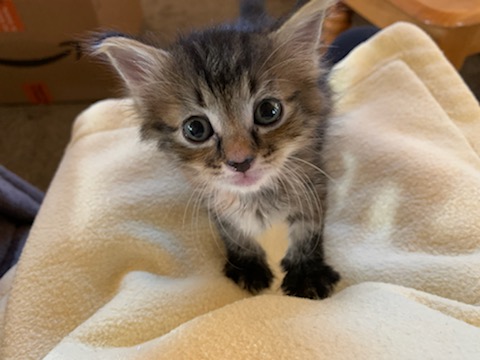Compassionate Cat Project: Fostering Cats On Campus

Sassy is one of the kittens caught on campus and fostered through the program.
Dr. Gail Grabowsky, the Dean of the School of Natural Sciences & Mathematics, is developing a program to reduce the feral cat population on the Chaminade University campus. The Compassionate Cat Care and Reduction Project lets students, staff, and faculty foster and adopt cats.
She started this program after noticing an increase in feral cats on campus. This program allows for a humane approach to removing the cats by catching, neutering, and preparing cats to be fostered and adopted with the help of volunteers from campus and the Hawaii Humane Society. So far, the program has removed 31 kittens from campus and neutered 11 free-roaming adults since its trial start in Spring 2021.
Feral cats have a significant impact on the native species in Hawaii and other islands. Hawaii is known as the extinction capital of the world and this is largely due to invasive species like feral cats. In New Zealand, feral cats eat endangered birds, and in Hawaii their feces can cause toxoplasmosis, which is fatal to monk seals if it gets into the water. A common method to control feral cat populations in New Zealand is euthanization, which Grabowsky wants to prevent and which the Hawaii Humane Society does not provide for healthy free-roaming cats.
Volunteering with the project lets students get research experience and community service hours. Some of the tasks participants can assist with are washing, catching, photographing, socializing, and working with technology to track the cats. Socializing caught kittens means playing with them to get them used to people so they can have a smoother transition when they’re adopted because they no longer fear humans and therefore make good pets.
Faith Chang is a junior Business major who volunteers with the program. She chose to volunteer because she recently adopted her dog from the Hawaii Humane Society. Prior to living with Chang, her dog was living on the street. Chang said she joined to help animals like her dog, who come off the street and put them into homes that can provide them a better life.
“My favorite part about volunteering is just being able to play with the fostered kittens and seeing them grow each week and knowing that I can be helping the cats to be ready for a family and I can be helping the cats to become adopted someday into a loving family,” said Chang, who lives in Kunia.
The project will also be the first in Hawaii to use an app to better record the cats on campus and throughout the island. An app called ArcGIS Collector helps to collect field data on cat colonies on Oahu. To track them, teams of volunteer cat counters walk along transect pathways determined by the Humane Society and record on the app where there are free-roaming cat sightings. This creates a map of potential cat colonies and will generate the first ever Oahu cat census data for the Humane Society and the National Oceanic and Atmospheric Association to view.
“It’s so educational, counting the cats, photographing the cats, learning what it takes to raise an animal, counting the cats in the community for the benefit of the community,” Grabowsky said. “Those are all super educational for you guys [the students].”
Grabowsky said that with the isolation of the Covid-19 pandemic, the program has been a sort of “cat therapy” for students who fostered kittens off campus.
Jode Samire, a junior Business major, has been fostering cats for over a year through the program with her roommate Izzie Krupa and even adopted one of the four cats they fostered. Prior to fostering the cats, Samire had never owned a cat but said she’s enjoyed her experience.
“Just having cats around during midterms and other stressful times is just so nice,” she said. “I never knew how nice it could be.”
The Compassionate Cat Care and Reduction Project is accepting volunteers, fosters, cat counters and adopters for the cats. For those interested in getting involved, contact Grabowsky at her email [email protected].